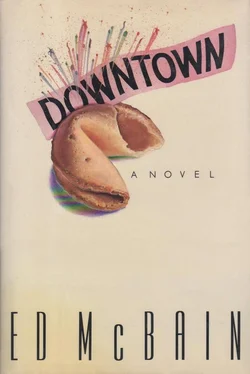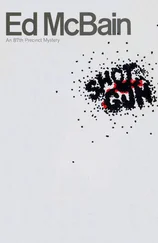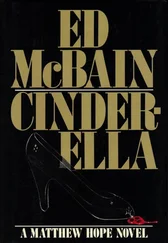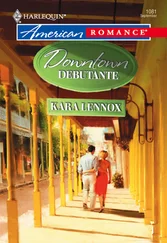“They’re rehearsing in the set for a play that’s already in performance,” Felix whispered, leaning over Connie, who was sitting between them.
“It’s only two a.m.,” Kenny said patiently, “just take all the time you need.”
“We just want to make sure we’ve got the right place,” the man with the sword said.
“The right place is Judy’s entrance,” Kenny said.
“From my line?”
“Yes, your line would be fine.”
“ ‘The White Knight? At your service, fair maiden?’ ”
“Yes, that is your line,” Kenny said. “Can we do it now, please?”
“Thank you,” the man with the sword said. “Judy, are you ready?”
“Please don’t call me Judy,” she said.
“Well, I’m not supposed to know you’re the Queen yet. You haven’t come in yet.”
“Yes, please do come in,” Kenny said. “Just say your line, Hal, and Judy will come in.”
“The play is called Stalemate,” Felix explained.
On the stage, the man with the sword said, “The White Knight. At your service, fair maiden.”
“I’m not a maiden,” Judy said. “I’m a queen.”
The White Knight knelt at once. “Your Majesty,” he said. “Forgive me.”
Judy turned to the man who looked like a peasant. “Who are you?” she asked.
“I am the White Knight’s squire,” he said, “a mere pawn. Your Majesty.”
“And this poor creature?” she asked, indicating the man in the black helmet.
“A helpless servant of the Queen, Your Majesty, tell him to put up his sword!”
“Release him,” Judy said.
“He’s a dangerous man, Your Majesty.”
“Release him, I say.”
The While Knight and his squire immediately let go of the man wearing the black helmet.
“Take off your helmet,” Judy said. “I want to see your face.”
“No,” the man in the helmet said.
“I’m a queen!” Judy said. “Do as I say!”
“You’re not my queen, lady,” the man in the helmet said, and immediately turned to look out into the theater. “Kenny,” he said, “I don’t get this, I really don’t. A minute ago, I’m calling her ‘Your Majesty,’ and now I’m telling her she’s not my queen.”
“That’s because this is the first time you can really see her,” Kenny said patiently.
“Why can’t I see her before this?”
“Because she’s standing in the dark. This is when she moves toward the fire. On ‘I’m a queen.’ she moves toward the fire. And you can see her face in the firelight, and that’s when you say ‘You’re not my queen, lady.’ ”
“Then whose queen is she?” the man in the helmet asked.
“That’s not the point, Jason. The point is...”
“You know, I think Judy’s right, you shouldn’t call us by our real names when we’re supposed to be other people.”
“It would be clumsy to call you ‘Black Knight,’ ” Kenny said.
“Then call me ‘Sire,’ ” the Black Knight said.
“Me, too,” the White Knight said.
“And what would you like to be called, Jimmy?”
“I’m the Pawn,” the young man in the peasant outfit said, looking stunned.
“Yes, that’s what the playwright has chosen to call you, the Pawn, that is part of the metaphor. The chess metaphor. But shall I call you ‘Pawn’ when I address you?”
“Yes, that would be fine, Kenny,” the young man said.
“Very well, then. Sire, would you please take it from your denial line?”
“Me?” the White Knight asked.
“No, the other sire, please.”
“My what line?” the Black Knight asked.
“The line where you deny the Queen. If you please.”
“Oh.”
“Thank you,” Kenny said.
Michael wondered if allegory and metaphor were one and the same thing. Whichever, it was certainly a very confusing play, at least the part of it they were rehearsing. At one point, he thought he was beginning to catch on to the idea that the Black Knight represented black men everywhere, but then the play swerved off in another direction and he figured he was wrong. Puzzled, he began to lose interest, until—
“I can still remember the day Arthur died,” the Black Knight said.
“Oh, yes, of course,” the Queen said, “the whole world remembers.”
“I’d been in the woods with a friend of mine,” the Black Knight said. “It was a bright, clear November day, the forest was alive with sound, we walked on crackling leaves, and breathed needles into our lungs. And when we came out of the forest, there was a beggar woman sitting by the side of the road, wringing her hands and weeping, and we said to her, ‘Why do you weep, old woman?’ and she answered, ‘Arthur is dead.’ And we didn’t believe her. Arthur could not be dead. But as we walked further along the road, we came upon more and more people, all of them saying, ‘Arthur is dead,’ until at last there was a multitude of people, all of them weeping and saying the same words, ‘Arthur is dead, Arthur is dead,’ and then we believed it. And the sun went out, and a wind rose up, and there was no longer the sound of life in this land of ours, there was only the sound of muffled drums.”
He’s talking about John F. Kennedy, Michael thought.
The Queen shuddered and said, “You’re a very morbid person.”
“He was a good king,” the Black Knight said,
“Yes, but we’ve all got to go sometime, you know.”
“Things would be different if he were still alive,” the Black Knight said. “He had a vision, that man, you could see it flashing in his eyes, you just knew he had a dream clenched tight in those hands of his. And when a man can dream that strong, it makes you want to join him, it makes you want to move right in and say, ‘Yes, Daddy, take me where you’re going, I’m with you, Daddy, let’s yell it out together.’ There was no bullshit about that man. I loved him.”
Now he’s talking about Martin Luther King, Jr., Michael thought.
“You talk too much,” the Queen said, “and not about the right things. Also, I don’t like profanity. And if you want to know something, I’m beginning to find you enormously boring and a trifle sinister.”
This is Alice in Wonderland, Michael thought.
“Besides, I don’t trust masked men,” the Queen said. “Nobody does.”
Everything in this city is Alice in Wonderland, Michael thought.
“This isn’t a mask!” the Black Knight shouted.
“Then what is it?”
“My head is inside this black cage,” the Black Knight shouted. “My brain is in here, I think in here, I feel in here, it is not a goddamn mask!”
“You’re frightening me,” the Queen said. “Look, the fire’s going out.”
“The fire went out the day Arthur died,” the Black Knight whispered.
“Very good,” Kenny said, “very nice indeed. Let’s take a ten-minute break, and then I want to do the dragon scene, the H-bomb scene.”
“Oh, God, is that it?” the White Knight said.
“Sire?”
“Is the dragon supposed to be the H -bomb?”
“Yes, Sire, that is the metaphor,” Kenny said.
“I’m glad to know that. Because, actually, I was wondering why I was so afraid of a little dragon. I’m supposed to be an experienced knight, but I’m afraid of a little dragon. It didn’t make sense to me. Now that you tell me it’s the H-bomb...”
“That’s the metaphor, yes.”
“Well, that’s an enormous relief, I can tell you. Did you know it was the H-bomb, Jason?”
“Oh, sure,” the Black Knight said, and both men walked off the stage. The Pawn, looking somewhat bewildered, followed them. “Ten minutes, please,” Kenny called after them, and left the theater through the curtained doorway that led to the one-room schoolhouse.
Читать дальше












